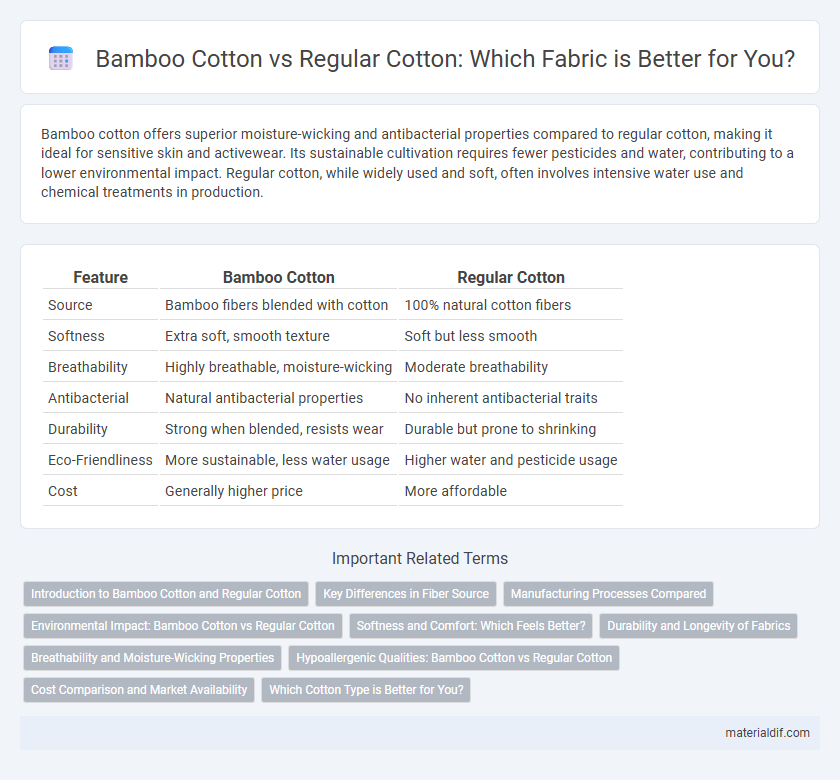Bamboo cotton offers superior moisture-wicking and antibacterial properties compared to regular cotton, making it ideal for sensitive skin and activewear. Its sustainable cultivation requires fewer pesticides and water, contributing to a lower environmental impact. Regular cotton, while widely used and soft, often involves intensive water use and chemical treatments in production.
Table of Comparison
| Feature | Bamboo Cotton | Regular Cotton |
|---|---|---|
| Source | Bamboo fibers blended with cotton | 100% natural cotton fibers |
| Softness | Extra soft, smooth texture | Soft but less smooth |
| Breathability | Highly breathable, moisture-wicking | Moderate breathability |
| Antibacterial | Natural antibacterial properties | No inherent antibacterial traits |
| Durability | Strong when blended, resists wear | Durable but prone to shrinking |
| Eco-Friendliness | More sustainable, less water usage | Higher water and pesticide usage |
| Cost | Generally higher price | More affordable |
Introduction to Bamboo Cotton and Regular Cotton
Bamboo cotton is a blend of bamboo fibers and traditional cotton, combining the moisture-wicking and antibacterial properties of bamboo with the softness and durability of cotton. Regular cotton is a natural fiber derived from the cotton plant, known for its breathability, absorbency, and comfort in textiles. Bamboo cotton fabrics often offer enhanced eco-friendliness and hypoallergenic benefits compared to standard cotton.
Key Differences in Fiber Source
Bamboo cotton is derived from bamboo cellulose, which is processed into a viscose or rayon fiber, while regular cotton comes directly from the cotton plant's seed hairs. Bamboo fibers typically offer a smoother texture and increased moisture-wicking properties compared to conventional cotton fibers. The renewable bamboo source grows faster and requires fewer pesticides, contrasting with traditional cotton cultivation's higher water usage and chemical treatments.
Manufacturing Processes Compared
Bamboo cotton is produced through a more eco-friendly manufacturing process that involves mechanically crushing bamboo stalks to extract fibers, which reduces chemical use and energy consumption compared to regular cotton that relies heavily on intensive irrigation, pesticides, and chemical treatments. Bamboo fibers undergo a natural antibacterial treatment during production, whereas regular cotton requires extensive chemical processing for pest resistance and dye absorption. The regenerative growth of bamboo and its minimal water needs position bamboo cotton as a sustainable alternative to conventionally farmed cotton, which demands significant land and water resources.
Environmental Impact: Bamboo Cotton vs Regular Cotton
Bamboo cotton has a lower environmental impact than regular cotton due to bamboo's rapid growth rate and minimal need for pesticides or fertilizers. Regular cotton cultivation often requires substantial water usage and chemical inputs, contributing to soil degradation and pollution. Bamboo cotton's sustainable farming practices reduce carbon footprint and promote soil health, making it an eco-friendly alternative to traditional cotton.
Softness and Comfort: Which Feels Better?
Bamboo cotton blends offer superior softness compared to regular cotton, thanks to bamboo fibers' naturally smooth texture, which feels gentle on the skin and reduces irritation. The moisture-wicking properties of bamboo cotton enhance overall comfort by keeping the fabric dry and breathable, making it ideal for sensitive or allergy-prone skin. Regular cotton tends to be slightly coarser and less effective at moisture management, which can impact comfort during extended wear or in warm climates.
Durability and Longevity of Fabrics
Bamboo cotton blends offer superior durability compared to regular cotton due to bamboo fibers' natural strength and resistance to wear and tear. Fabrics made from bamboo cotton maintain their softness and structural integrity over numerous washes, extending the lifespan of clothing and textiles. In contrast, regular cotton tends to break down faster with repeated laundering, resulting in quicker fabric degradation and reduced longevity.
Breathability and Moisture-Wicking Properties
Bamboo cotton blends exhibit superior breathability compared to regular cotton due to the natural micro-gaps in bamboo fibers that enhance air circulation. Moisture-wicking properties in bamboo cotton outperform standard cotton by effectively drawing sweat away from the skin, keeping the wearer drier and more comfortable during physical activities. These characteristics make bamboo cotton an ideal choice for activewear and summer clothing where temperature regulation and moisture management are crucial.
Hypoallergenic Qualities: Bamboo Cotton vs Regular Cotton
Bamboo cotton fibers possess natural antimicrobial properties and moisture-wicking abilities, making them inherently hypoallergenic and less likely to cause skin irritation compared to regular cotton. Regular cotton, although soft and breathable, may retain more allergens and requires chemical treatments that can trigger sensitivities in some individuals. Bamboo cotton textiles offer superior breathability and resistance to bacteria, benefiting those with sensitive skin or allergies.
Cost Comparison and Market Availability
Bamboo cotton tends to be more expensive than regular cotton due to higher production costs and eco-friendly processing methods. Regular cotton dominates the market with broader availability and affordability, benefiting from established supply chains and mass production. Consumers seeking sustainable options may pay a premium for bamboo cotton despite its limited market presence compared to conventional cotton products.
Which Cotton Type is Better for You?
Bamboo cotton offers superior softness, breathability, and moisture-wicking properties compared to regular cotton, making it ideal for sensitive skin and active lifestyles. Regular cotton tends to be more durable and widely available, providing a cost-effective option for everyday use. Choosing between bamboo cotton and regular cotton depends on your priority for comfort, environmental impact, and budget.
Bamboo Cotton vs Regular Cotton Infographic

 materialdif.com
materialdif.com